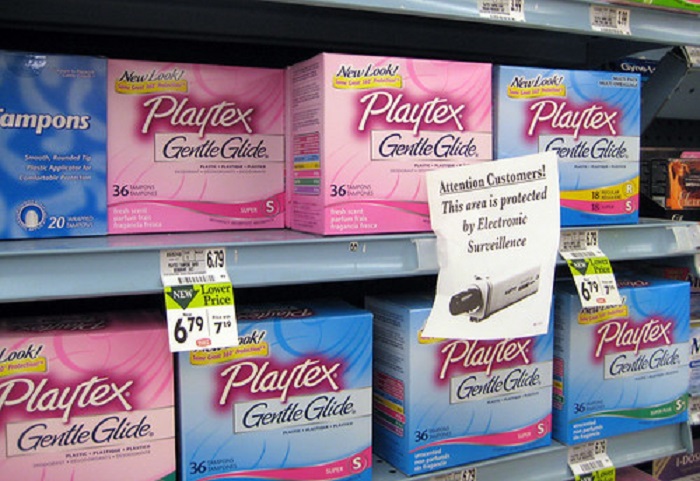
A tampon shortage that has left shelves bare across the country in recent weeks, fueling reports of price increases online for menstrual products, is drawing the attention of Congress.
Sen. Maggie Hassan, a New Hampshire Democrat, is requesting that manufacturers Procter & Gamble, Edgewell Personal Care, Johnson and Johnson and Kimberly-Clark share by the end of the week how they plan to increase their supplies of tampons, according to a copy of a letter sent Monday and shared exclusively with The 19th. Hassan is also calling for answers on anecdotal reports of price gouging for tampons that have surfaced on Amazon, after Time reported last week that a box of 18 tampons was priced as high as $114 in January.
Those reports don’t appear to be widespread yet, but shortages in major retailers are. Photos and social media posts from people around the country show empty tampon shelves at pharmacies and grocery stores. Pads remain in stock and do not appear to have been affected by similar problems. P&G, which produces Tampax and holds about half of the market share of menstrual products in the United States, confirmed in a statement to The 19th that it is experiencing a shortage that it expects to be “temporary.” The company did not respond to questions about when stock levels will return to normal. The company said in an April earnings call that it was seeing supply chain issues tied to transportation and sourcing of raw materials.
The tampon shortage is reminiscent of the shortages of toilet paper and cleaning supplies that hit stores early in the pandemic — and Hassan said she wants this shortage to be treated with the same urgency.
Tampons, like pads and other menstrual products, are essential items. Poor menstrual hygiene is linked to an increased risk of infections, rashes, inflammation and toxic shock syndrome, which is a condition caused by a bacterial infection and is potentially fatal. Lack of access to menstrual products is also an issue for low-income people, who report missing work or school because they can’t afford sufficient menstrual hygiene products.
“Access to menstrual products should be treated like every other essential good,” Hassan wrote in her letter to the major manufacturers. “At the beginning of the pandemic, price gouging of essentials like toilet paper, cleaning supplies, and hand sanitizer was rightly criticized as an exploitation of an emergency for financial gain. Menstrual products should receive that same consideration.”
But they have not been treated as essential goods legislatively. Menstrual products are taxed like other goods in 26 states, though a number of states have moved in the past decade to exempt them, according to Period Law, an organization that has been working to end the “tampon tax.” Tampons are also not covered under federal aid programs for low-income people, including the Supplemental Nutrition Assistance Program (SNAP) and WIC, the program for low-income women and children.
The pandemic coronavirus relief bill, the CARES Act, included a provision that for the first time counted menstrual products as a “qualified medical expense” that could be purchased with pre-tax dollars through health savings accounts (HSAs) and flexible spending accounts (FSAs). But that excludes many low-income people who don’t have access to health insurance through their employer.
“As our economy responds to supply chain shortages, too often essential goods for women and families are sidelined and not given the attention and urgency they deserve,” Hassan told The 19th.
Some people have had to drive to multiple stores to find enough tampons to get by. In Stow, Ohio, Kimberly Georgekopoulos, a mother of 17-year-old and 20-year-old daughters, said she has searched her local Rite Aid, CVS, Walgreens and Target in the past few weeks looking for tampons. Sometimes she can’t find any at all, other times she can only find one box of the type they use — Tampax Ultras.
“It’s been like, ‘Oh my gosh, what are we gonna do?’ And I don’t want to waste gas going all over God’s creation trying to find it,” Georgekopoulos said. “This is the last thing I expected. They could charge us $50 for a box of tampons and we’d still buy it because what are we gonna do?”
The tampon shortage is similar to what’s playing out with a continuing baby formula shortage. One in five states were reporting they only had about 10 percent of their normal stock as of late May.
Jennifer Weiss-Wolf, the author of “Periods Gone Public: Taking a Stand for Menstrual Equity,” said the two shortages and the attention they’ve drawn from Congress when severe shortages happen show just how little focus was put on issues affecting women — attention that could have prevented the shortages in the first place.
The shortages are “sort of a light shined on how little the people who are responsible for making decisions about our lives know about how our lives unfold and our bodies work,” Weiss-Wolf said. “Menstruation is as important as everything.”
Originally published by The 19th

